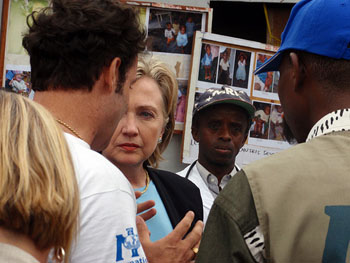
When Secretary Clinton set off for her first trip to Africa as America’s top diplomat, many people noted her interest in delving into some of the continent’s most complex challenges. Her visit today to eastern Congo was a prime example of smart US diplomacy and it was directed at a complicated conflict that has gone overlooked for far too long – with utterly devastating consequences.
From reports from media traveling with Secretary Clinton and readouts from Enough staff in Goma, the secretary rightly stressed the crucial role of the Congolese government in ending the conflict in the east that is notorious for brutal and prevalent sexual violence. But as the mounting death toll surpasses 5.4 million and the world’s largest peacekeeping force looks on, failing time and again to protect civilians, Secretary Clinton made clear that the international community, and the US government in particular, must take concrete action. “This problem is too big for one country to solve alone,” she said in a meeting with Congolese doctors and human rights advocates gathered at the Heal Africa clinic in Goma, according to the New York Times.
Civilian protection topped the agenda when Secretary Clinton spoke with Congolese President Joseph Kabila, whose own soldiers perpetrate much of the violence and have a hand in the trade of conflict minerals that finances the fighting. Speaking to a reporter with Radio Okapi about the government’s human rights record, Secretary Clinton said:
"It’s in desperate need of improvement. The Congolese Government, of course, came out of many years of war, and that is very destabilizing to societies and very often human rights are considered a luxury during wartime. But there are no excuses any longer, and there has to be more expected from the government here. The United States and other countries, as well as the United Nations, stand ready to assist the government in taking actions to both promote human rights, including women’s rights, and to punish violators of human rights and women’s rights. But there needs to be much more action and a greater commitment from the government."
In discussing her meeting with Kabila, Clinton accurately cited impunity as one of the main drivers of conflict:
“I spoke at length with President Kabila about the steps needed to be taken to protect civilians. We believe there should be no impunity for the sexual and gender based violence, and there must be arrests and punishment because that runs counter to peace.”
As a centerpiece of renewed US attention to Congo, Clinton announced a new $17 million pledge from the United States to support and train NGOs and doctors providing services to rape survivors and help train police to combat rape. While this figure is moderate compared to the U.N. mission’s $1.3 billion budget, the announcement hopefully signals more attentive US engagement to come in eastern Congo.
As with any high-level, closely watched visit by a US dignitary, the true significance of Secretary Clinton’s trip will become clear in the coming weeks and months as the US unrolls its plan and positions its personnel (read: Great Lakes envoy). To be sure, the US will have to get much more actively engaged in pressing the Congolese government and regional actors to confront the root causes of the region’s instability, a daunting task given the profits many actors reap by fueling Congo’s chaos.
But the bottom line is that Secretary Clinton should be commended for her unbridled words about the major obstacles to peace in Congo and her personal dedication to raising awareness about rampant sexual violence.
HT to NYTimes for the headline, which is a riff on the (first) title of the paper’s feature story on President Obama’s first speech in sub-Saharan Africa: In Ghana, Obama Preaches Tough Love.

